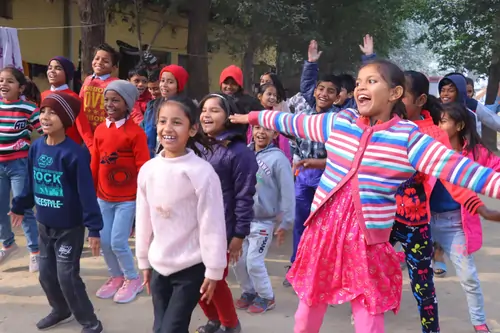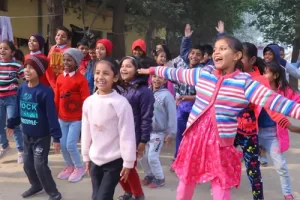The Role of NGOs in Early Childhood Care and Education

The Role of NGOs in Early Childhood Care and Education

In the intricate journey of a child’s life, the earliest years are like the delicate threads that weave the fabric of their future. Early childhood care and education (ECCE) serve as the gentle hands that mold a child’s cognitive, emotional, social, and physical growth, setting the stage for their lifelong journey. Amidst the rich tapestry of India’s diversity and the challenges it poses, the presence of Non-Governmental Organizations (NGOs) becomes a beacon of hope in championing ECCE. Let’s explore the profound significance of ECCE, the invaluable role NGOs play, and the profound impact they have on shaping child education and development.
Importance of Early Childhood Care and Education
In the tender years of early childhood, the mind blossoms with astonishing speed, soaking in knowledge like a sponge. ECCE serves as the nurturing soil where seeds of cognitive skills, emotional resilience, and social adeptness are planted. This foundation not only paves the path for academic success but also fosters lifelong health and overall well-being. In a nation where disparities in education and healthcare persist, investing in ECCE emerges as a potent catalyst for breaking the shackles of poverty and inequality.
Why NGOs are Important for Education
NGOs, with their roots deeply embedded in local communities, emerge as lifelines in the vast sea of educational needs. They venture into remote corners where governmental reach falls short, extending their arms to embrace marginalized communities and underserved populations. NGOs bridge the chasm by providing inclusive early childhood care and education, advocating fervently for child rights, and empowering communities to take charge of their children’s educational journey.
How Do NGOs Make an Impact on Child Education?
NGOs craft tangible transformations in child education through their multifaceted endeavors. They erect preschools and early learning hubs, ensuring that every child, regardless of circumstance, has access to the light of education. Through rigorous teacher training and nurturing environments, they cultivate fertile grounds for learning to thrive. Moreover, NGOs collaborate with governmental bodies and stakeholders to steer policy changes, catalyzing systemic shifts in the educational landscape.

NGOs’ Role in Child Development and Support
Beyond education, NGOs emerge as staunch guardians of holistic child development. By extending healthcare to underprivileged children, they dismantle the barriers that hinder learning and growth. From immunization drives to nourishment initiatives, NGOs prioritize the well-being of children, laying robust foundations for their future endeavors.
Providing Healthcare to Underprivileged Children
Inclusive education transcends mere classroom access; it encompasses addressing the diverse needs of children. Many NGOs spearhead healthcare initiatives tailored to the unique requirements of underprivileged children. Through medical check-ups, vaccinations, and nutritional support, they ensure that health disparities do not cast shadows on a child’s right to education.
Understanding the Importance of Child Development
Child development is a symphony of biological, environmental, and socio-economic notes. NGOs acknowledge this complexity and orchestrate comprehensive approaches to nurture every facet of a child’s growth.
Ensuring Access to Education
At the heart of NGO endeavors lies an unwavering commitment to universal educational access. They erect educational havens in remote corners, conduct outreach missions to enroll out-of-school children and extend scholarships to deserving students. By dismantling barriers to education, NGOs illuminate the path toward a brighter future for countless children.
Nurturing Health and Nutrition for Flourishing Minds
Healthy bodies harbor flourishing minds. NGOs prioritize health and nutrition interventions, orchestrating regular health camps, providing wholesome meals, and instilling hygiene practices. By addressing health inequalities, they cultivate fertile grounds where learning blossoms unhindered.
Championing Protection and Safety
Childhood should be an era of innocence and exploration, shielded from the shadows of harm and exploitation. NGOs tirelessly advocate for children’s rights, vehemently opposing child labor, trafficking, and abuse. They carve safe havens where children can learn and frolic, cocooned in a sense of security and well-being.
Providing Emotional and Social Support
In the journey of growth, children require more than academic nourishment—they crave emotional support and social skills to navigate life’s labyrinth. NGOs extend counseling services, foster peer support groups, and orchestrate extracurricular activities to fortify children’s emotional resilience and social understanding.
Empowering Families and Communities
The seeds of transformation are sown at the grassroots level. NGOs empower families and communities to actively participate in their children’s educational odyssey. Through parent-teacher collaborations, community workshops, and skill enhancement programs, they cultivate a culture of involvement and ownership, ensuring enduring progress in education.
In summation, the role of NGOs in early childhood care and education stands as an indomitable force. Through their unwavering commitment to inclusive education, advocacy for child rights, and cultivation of holistic development, NGOs illuminate the path toward a radiant future for India’s children.